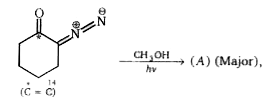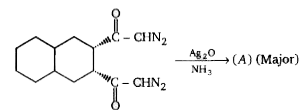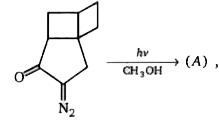Which of the following alcohols will yield the corresponding alkyl chloride on reaction with concentrated HCl at room temperature ?
Thinking process
To solve this problem, students keep in mind that tertiary alcohol being most reactive react at room temperature.
The correct Answer is:D
To determine which alcohol will yield the corresponding alkyl chloride upon reaction with concentrated HCl at room temperature, we need to analyze the stability of the carbocations formed during the reaction. Here’s a step-by-step breakdown of the solution:
1. Identify the Alcohols: List the given alcohols and their structures. We will analyze each one to see if it can form a carbocation upon reaction with concentrated HCl.
2. Protonation of Alcohol: When an alcohol reacts with concentrated HCl, the hydroxyl group (-OH) is protonated by HCl to form a better leaving group, water (H2O). This step generates a protonated alcohol (ROH2+).
3. Formation of Carbocation: The protonated alcohol then loses a water molecule, forming a carbocation (R+). The stability of this carbocation is crucial for determining whether the reaction will proceed.
4. Stability of Carbocations: Recall that the stability of carbocations increases in the following order:
- Primary (1°) < Secondary (2°) < Tertiary (3°)
Therefore, tertiary alcohols will form the most stable carbocations and are more likely to react at room temperature.
5. Analyze Each Alcohol:
- 1-Propanol (1°): Forms a primary carbocation, which is unstable. Reaction is unlikely.
- 2-Butanol (2°): Forms a secondary carbocation, which is more stable than a primary but less stable than a tertiary. Reaction can occur but is slower.
- 2-Pentanol (2°): Similar to 2-butanol, forms a secondary carbocation. Reaction can occur but is slower.
- Tertiary Butanol (3°): Forms a tertiary carbocation, which is very stable. Reaction will occur readily at room temperature.
6. Conclusion: Since tertiary alcohols form the most stable carbocations and react readily with HCl, the alcohol that will yield the corresponding alkyl chloride at room temperature is Tertiary Butanol.
Final Answer:
The alcohol that will yield the corresponding alkyl chloride on reaction with concentrated HCl at room temperature is Tertiary Butanol.
---
- Primary (1°) < Secondary (2°) < Tertiary (3°)
Therefore, tertiary alcohols will form the most stable carbocations and are more likely to react at room temperature.
- 1-Propanol (1°): Forms a primary carbocation, which is unstable. Reaction is unlikely.
- 2-Butanol (2°): Forms a secondary carbocation, which is more stable than a primary but less stable than a tertiary. Reaction can occur but is slower.
- 2-Pentanol (2°): Similar to 2-butanol, forms a secondary carbocation. Reaction can occur but is slower.
- Tertiary Butanol (3°): Forms a tertiary carbocation, which is very stable. Reaction will occur readily at room temperature.
The alcohol that will yield the corresponding alkyl chloride on reaction with concentrated HCl at room temperature is Tertiary Butanol.
Topper's Solved these Questions
- HALOALKANES AND HALOARENESBOOK - NCERT EXEMPLAR ENGLISHCHAPTER - HALOALKANES AND HALOARENESEXERCISE - MCQs (More than one option)
12 Videos
- HALOALKANES AND HALOARENESBOOK - NCERT EXEMPLAR ENGLISHCHAPTER - HALOALKANES AND HALOARENESEXERCISE - Short Answer Type Questions
35 Videos
- GENERAL PRINCIPLE AND PROCESSES OF ISOLATION OF ELEMENTS BOOK - NCERT EXEMPLAR ENGLISHCHAPTER - GENERAL PRINCIPLE AND PROCESSES OF ISOLATION OF ELEMENTS EXERCISE - Long Answer Type Questions
1 Videos
- P-BLOCK ELEMENTSBOOK - NCERT EXEMPLAR ENGLISHCHAPTER - P-BLOCK ELEMENTSEXERCISE - Long Answer Type Questions
3 Videos
Similar Questions
Account for the following :
Mg3N2 when reacted with water gives NH3 but HCl is not obtained from MgCl2 on reaction with water at room temperature.
View SolutionWrite balanced chemical equations for the following:
i] Reaction between 1, 2 - dibromoethane & alcoholic potassium, hydroxide.
ii] Monochloro ethane is hydrolysed with aqueous KOH.
iii] A mixture of sodalime and sodium acetate is heated:
iv] Ethanol under high pressure & low temperature is treated with 'acidified potassium dichromate,
v] Water is added to calcium carbide.
vi] Ethanol reacts with sodium af room temperature.
View Solution
Knowledge Check
Which of the following is used to prepare Cl2 gas at room temperature from concentrated HCl ?
AMnO2BH2SCKMnO4DCr2O3Wolff rearrangement
When α-Diazoketones are photo-irradiated or heated at high temperature or reacted with silver oxide or silver salts at room temperature, they loose nitrogen and rearrange to form ketene.
The ketenes reacts rapidly with water, alcohol and amines. Therefore, the reactions called Wolff-rearrangement.

 Major product of the reaction is : A
Major product of the reaction is : A B
B C
C DNone of these
DNone of theseWolff rearrangement
When α-Diazoketones are photo-irradiated or heated at high temperature or reacted with silver oxide or silver salts at room temperature, they loose nitrogen and rearrange to form ketene.
The ketenes reacts rapidly with water, alcohol and amines. Therefore, the reactions called Wolff-rearrangement.

 Product (A) is : A
Product (A) is : A B
B C
C D
D
Wolff rearrangement
When α-Diazoketones are photo-irradiated or heated at high temperature or reacted with silver oxide or silver salts at room temperature, they loose nitrogen and rearrange to form ketene.
The ketenes reacts rapidly with water, alcohol and amines. Therefore, the reactions called Wolff-rearrangement.

 , Product (A) is :
, Product (A) is :
View SolutionWolff rearrangement
When α-Diazoketones are photo-irradiated or heated at high temperature or reacted with silver oxide or silver salts at room temperature, they loose nitrogen and rearrange to form ketene.
The ketenes reacts rapidly with water, alcohol and amines. Therefore, the reactions called Wolff-rearrangement.

 , Product (A) is :
, Product (A) is :
View SolutionWolff rearrangement
When α-Diazoketones are photo-irradiated or heated at high temperature or reacted with silver oxide or silver salts at room temperature, they loose nitrogen and rearrange to form ketene.
The ketenes reacts rapidly with water, alcohol and amines. Therefore, the reactions called Wolff-rearrangement.

Ph−O∣∣C14−CHN2Ag2O−−→H2O(A) , Product (A) is :
View SolutionWolff rearrangement
When α-Diazoketones are photo-irradiated or heated at high temperature or reacted with silver oxide or silver salts at room temperature, they loose nitrogen and rearrange to form ketene.
The ketenes reacts rapidly with water, alcohol and amines. Therefore, the reactions called Wolff-rearrangement.

Ph−N2∣∣C−CH2OCH3−−→Δ(A)90%, product (A) is :
View SolutionWolff rearrangement
When α-Diazoketones are photo-irradiated or heated at high temperature or reacted with silver oxide or silver salts at room temperature, they loose nitrogen and rearrange to form ketene.
The ketenes reacts rapidly with water, alcohol and amines. Therefore, the reactions called Wolff-rearrangement.

HO−CH2−CH2−CH2−O∣∣C−CHN2Ag2O−−→Δ(A), Product (A) is :
View Solution
